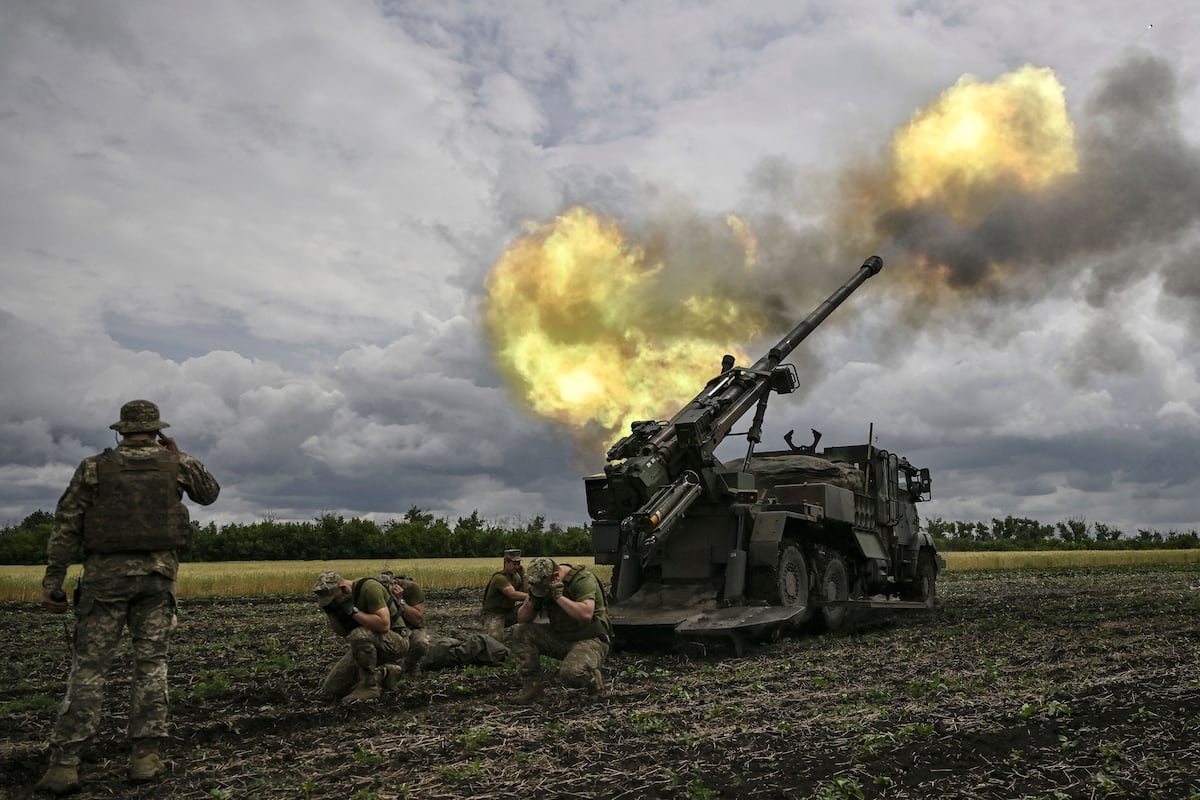PARIS — France is calling for a new European plan to ramp up ammunition production, including of complex ordnance such as missiles, and wants to move forward at a meeting of European Union defense ministers in Warsaw this week, French Armed Forces Minister Sébastien Lecornu said.
Lecornu will also ask the European Commission to speed up deployment and increase the budget for the IRIS² sovereign satellite constellation, the French minister said in a press briefing with his Danish counterpart, Troels Lund Poulsen, in Paris on Tuesday afternoon.
The defense ministers are meeting on April 2 and 3 to discuss a white paper on the future of European defense, developing and financing defense capabilities within the 27-nation bloc, and military support for Ukraine. Lecornu said policymakers need to move on to concrete measures to build up Europe’s defense industry.
“We have to stop with the big speeches, we have to stop with the packages of billions where we don’t always know exactly how it works,” Lecornu said. “We need things that are sometimes perhaps more modest, but very effective.”
The EU’s Act in Support of Ammunition Production “worked, we are therefore calling for a new edition of an ASAP-type facility,” according to Lecornu. The European Commission allocated €500 million ($540 million) through the program to boost ammo output, and now forecasts the bloc will produce 2 million artillery shells this year, from an estimated annual capacity of 230,000 rounds in early 2023.
A new ammo program should cover both simple and complicated munitions, including missiles, the French minister said. EU aid could help in a hypothetical scenario where missile maker MBDA sets up licensed production in European countries by adding to corporate financing and purchases by the host country, according to Lecornu.
France has support from other EU members to ask the Commission to speed up the IRIS² plan for a sovereign European satellite constellation, Lecornu said, declining to name the countries. The project is key to European strategic autonomy and is progressing, but has “an enormous challenge in terms of execution time,” the minister said.
The consortium picked to deploy the satellite constellation, led by SES, Eutelsat and Hispasat, is targeting full operational status for the early 2030s, pushing back IRIS² by several years compared to an EU timetable in March 2023 that envisaged full service in 2027.
“It’s an issue on which the commission is obviously eagerly awaited and on which we’d like to help,” Lecornu said. “It’s about money because it’s about speeding up, and money means speeding up. It may also be about simplifying the organization, the very governance of IRIS².”
“It makes sense, because we don’t have a solution, we don’t have a plan B, it’s either that or Starlink,” Lecornu said, referring to the satellite constellation operated by Elon Musk’s SpaceX.
“The problem is, we have industrial time that is sometimes decorrelated from diplomatic time,” Lecornu said. “I’m trying to reduce diplomatic time, because there are still people making noise and doing complicated things, when in fact there are industrial opportunities.”
Denmark formalized the purchase of French Mistral short-range air defense missiles in Paris, and “we can do even more together,” Lund Poulsen said. “I hope also that it will be possible to make further announcements in the coming month about new procurements in France. I think the French defense companies have a lot to offer.”
The Danish government in February agreed to allocate an additional 50 billion kroner ($7.2 billion) to defense over the coming two years, boosting defense spending to more than 3% of GDP in 2025 and 2026.
The Nordic nation is looking to rebuild an air-defense bubble after decommissioning its Hawk missile systems in 2005. Denmark last month shortlisted the French-Italian SAMP/T and the U.S. Patriot air-defense batteries to cover the high end of the threat spectrum in its planned purchase, while MBDA France’s VL MICA system, Kongsberg’s NASAMS, the IRIS-T SLM from Germany’s Diehl Defence and the U.S. IFPC. are in competition for the lower end.
“We are in Denmark very concerned about the situation with the land-based air-defense system, because we don’t have any,” Lund Poulsen said. He expects the government will be able to make a decision “before summer.”
“I’m very happy that France also today have told me directly that they will be willing to collaborate with Denmark in that context,” the Danish minister said. “We have to see the offers that will come in, but let me just underline that it is of our interest also to have a decision before summer.”
Buying SAMP/T would make Denmark the first export customer in the EU for the long-range air-defense system, with France and Italy currently the only users in the 27-nation bloc. Ukraine uses a donated SAMP/T system to defend the Kyiv area, while Singapore is the only other export user following a purchase in 2013.
Meanwhile, Lund Poelsen commented on the American military presence in Greenland, an autonomous territory of Denmark, where the U.S. operates Pituffik Space Base. U.S. President Donald Trump has threatened to annex Greenland, citing security needs.
“Denmark has a long-lasting good relationship with the U.S., also about the security in Greenland,” the minister said. He said Denmark has an agreement from 1951 about the U.S. presence in the territory. “So if the U.S. would like to have more bases in Greenland, it is possible for them to raise that question to the Danish government. And will they be doing that? We’ll be willing to discuss that.”
Rudy Ruitenberg is a Europe correspondent for Defense News. He started his career at Bloomberg News and has experience reporting on technology, commodity markets and politics.
Read the full article here








Leave a Reply